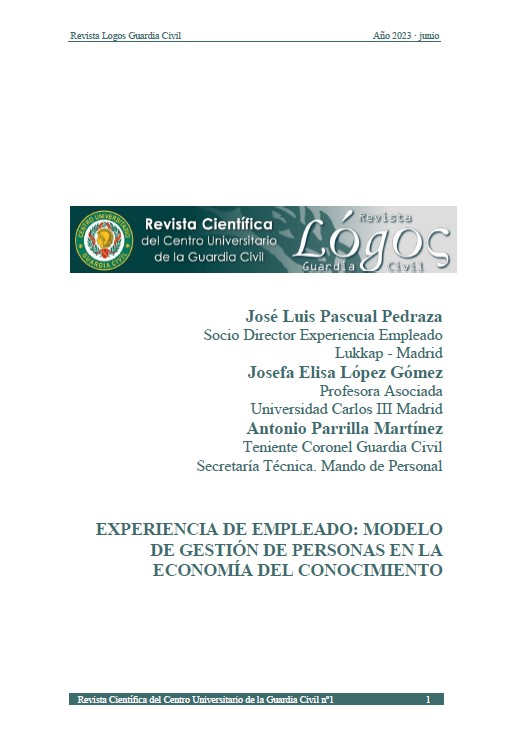EMPLOYEE EXPERIENCE: PEOPLE MANAGEMENT MODEL IN THE KNOWLEDGE ECONOMY
Keywords:
Knowledge Economy, Management model, People Analytics, Talent, Commitment, Employee Experience, leadership, eNPS, Public Administration, Civil GuardAbstract
We are immersed in the so-called knowledge economy, caused among other aspects by the possibilities that digital transformation offers us and in this economic context there are two fundamental parameters for the management of organizations, the first is the degree of digitization of the activities that are carried out and the second is the awareness that the differential value of these digitized companies is the human talent they can count on and that can make the difference between successful organizations and those that will not.
The importance of talent in this environment is key and it has become a rare commodity that must be taken care of, which is why people management is highly critical within companies and the focus on management must be focused in making real this differential value that individuals can contribute, listening to their needs and creating relationship models that are adapted and consistent with the DNA of the companies. For this, the Employee Experience model has emerged.
In order to achieve adequate results, organizations have to adapt their people management models to the new economic reality, creating management models focused on providing them with adequate support, turning employees into internal customers and making them live the best of experiences.
The purpose of this article is to expose both conceptually and through concrete data how the management model focused on the employee experience can help meet the challenges of our organizations, both private and public, in terms of people management.
Within the framework of the Public Administration and, more specifically in the Civil Guard, the model proposed here can provide objective data that provide valuable information for decision-making in people management.
Downloads
References
- ADP Researh Institute (2020). Global Workplace Study 2020. www.adpri.org. Recu-perado de https://www.adpri.org/research/global-workplace-study/
- Alcoba, J. y Mora, L. (2022). Cómo construir la Experiencia de Empleado. Claves para lograr compromiso con la organización. Lid Editorial.
- Alonso, M. (2022). [en línea]. Entornos VUCA: gestión de proyectos en un mundo cambiante. Consultado el 21 de abril de 2023. https://asana.com/es/resources/vuca
- Bell, D. (1976). The coming of Post-Industrial Society A venture in social forecasting. Harmondsworth: Peregrine.
- Bennett, N. & Lemoine, G.J. (2014). [en línea]. What VUCA Really Means for You. Harvard Business Review. Consultado el 21 de abril de 2023. https://hbr.org/2014/01/what-vuca-really-means-for-you
- Calleja, R., Méndez, E. y Rojo P. (2019). La Experiencia de Empleado: cuando el cliente también es interno. Harvard Deusto Business Review, 291. pp. 52-66.
- Cervi, P. (2021). Futuro. Ciudad Autónoma de Buenos Aires, Argentina: Ediciones Lea.
- Cascio, (2020). [en línea]. Consultado el 21 de abril de 2023. https://medium.com/@cascio/facing-the-age-of-chaos-b00687b1f51d
- Castells, M. (1999) La Era de la Información: Economía, Sociedad y Cultura: La so-ciedad Red. México: Siglo XXI.
- Derek, H., Chen, C. & Dahlman C. J. (2006). The Knowledge Economy, the KAM Methodology and world bank operations. World Bank Institute. Washington, D.C. Recuperado de https://documents1.worldbank.org/curated/en/695211468153873436/pdf/358670WBI0The11dge1Economy01PUBLIC1.pdf
- Gallup, (2021). State of the Global Workplace. Recuperado de www.gallup.com. https://www.gallup.com/workplace/349484/state-of-the-global-workplace-2022-report.aspx
- Gartner (2015). Gartner for Marketers. Recuperado de https://blogs.gartner.com/jakesorofman/gartner-surveys-confirm-customer-experience-new-battlefield/
- Garton, G. & Mankins, M. (2015). Engaging Your Employees Is Good, but Don’t Stop There. Harvard Business Review. [en línea]. Consultado el 25 de abril de 2023. https://hbr.org/2015/12/engaging-your-employees-is-good-but-dont-stop-there
- IBM and Globoforce. (2016). The Employee Experience Index: A new global measure of human workplace and its impact. Workhuman Research Institute.
- Lukkap y AEDRH (2021). Libro Blanco de la Experiencia de Empleado, Concepto, Metodología y Retos. Recuperado de https://www.lukkap.com/estudio/libro-blanco-de-la-experiencia-de-empleado/
- Mazor, A. H., Zucker, J., Sivak, M., Coombes, R., & Van Durme, Y. (2017). Reimag-ine and craft the employee experience: design thinking in action. Deloitte Develop-ment LLC.
- Maylett, T., & Wride, M. (2017). The employee experience: How to attract talent, re-tain top performers, and drive results. New York: John Wiley & Sons.
- Morgan, J. (2017). The employee experience advantage: How to win the war for talent by giving employees the workspaces they want, the tools they need, and a culture they can celebrate. New York: John Wiley & Sons.
- Pascual, J.L. (2018). La experiencia de empleado para escuchar, entender y actuar. Revista Capital Humano. Recuperado de https://www.equiposytalento.com/elsector/pag/director-de-experiencia-de-empleadodesarrollo/lukkap/jose-luis-pascual/2018-12-27/54
- Pascual, J.L, Hernanz, M (2021). Los 7 retos de la Experiencia de Empleado en 2021. Recuperado de https://www.lukkap.com/estudio/los-7-retos-de-la-experiencia-de-empleado-en-2021/
- Pascual, J.L (2023) ¿Por qué las relaciones laborales están muertas? [en línea]. Consultado el 23 de abril de 2023. https://www.lukkap.com/articulo/por-que-las-relaciones-laborales-estan-muertas/
- Plaskoff, J. (2017). Employee experience: the new human resource management approach. Strategic HR Review.
- Schmitt, B.H. (2010). Customer experience management: a revolutionary approach to connecting with your customers. New York: John Wiley and Sons.
- Yohn, D. L. (2016). Design your employee experience as thoughtfully as you design your customer experience. Harvard Business Review. Recuperado de https://hbr.org/2016/12/design-your-employee-experience-as-thoughtfully-as-you-design-yourcustomer-experience
- Whitter, B. (2019). Employee Experience, Develop a happy, productive and supported workforce for exceptional individual and business performance. London, UK: KoganPage Ltd.

Downloads
Published
Versions
- 2023-06-30 (2)
- 2023-06-28 (1)
How to Cite
Issue
Section
License
Copyright (c) 2023 Josefa Elisa López Gómez, José Luis Pascual Pedraza, Antonio Parrilla Martínez

This work is licensed under a Creative Commons Attribution-NonCommercial-NoDerivatives 4.0 International License.
-
Attribution — You must give appropriate credit, provide a link to the license, and indicate if changes were made. You may do so in any reasonable manner, but not in any way that suggests the licensor endorses you or your use.
-
NonCommercial — You may not use the material for commercial purposes.
-
NoDerivatives — If you remix, transform, or build upon the material, you may not distribute the modified material.
- No additional restrictions — You may not apply legal terms or technological measures that legally restrict others from doing anything the license permits.



